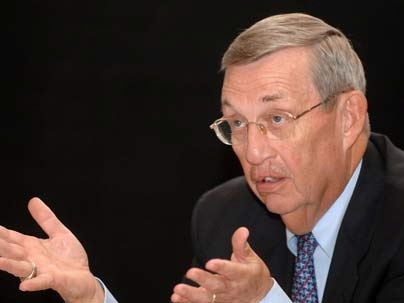The world is not running out of oil, but getting it out of the ground to meet a projected global energy demand of 120 million barrels a day by 2030 will be a major challenge on several fronts, former ExxonMobil chief Lee R. Raymond said at MIT Nov. 6.
Raymond is chairman of the National Petroleum Council (NPC), a privately funded federal advisory committee that in July released a report on oil and natural gas trends, "Facing the Hard Truths about Energy."
Raymond, a chemical engineer, said he is awed by technological advances over the past 30 years, and he is confident the coming 30 years will spawn equally impressive advances. But complex challenges such as geopolitical and economic uncertainties may make it difficult to satisfy the predicted 50-60 percent increase in worldwide consumption by 2030, he said.
Institute Professor John M. Deutch, who introduced Raymond and provided a question-and-answer forum for the talk in Bartos Theatre, called the NPC report comprehensive, thoughtful and provocative. The event was an MIT Energy Initiative colloquium.
To meet future energy needs, the NPC report advocates increasing energy efficiency; expanding clean coal, nuclear, biomass and other renewables; and developing a legal and regulatory framework to enable carbon capture and sequestration, among other related goals.
"There are no quick fixes, there are no silver bullets" to meeting these goals, he noted.
Much of our future oil will continue to come from politically precarious regions such as the Persian Gulf, Venezuela, Nigeria, Angola and the Sudan, Raymond said. But since the total wealth of these countries is based in their oil resources, they will continue to produce oil: They need the financial stability these resources ensure, he predicted.
"Energy independence was a bad idea when Richard Nixon said it, and it's a worse idea today. We're all in this together," he said.
Raymond, who began his career with Exxon in 1963, weighed in on several issues:
On climate change: "The climate of the Earth has continually changed long before there was man. You have to understand more than man's involvement. You need to deal with energy issues while trying to balance environmental issues, security issues, economic issues."
On climate-driven imperatives to curb fossil fuels: "For those who say we can't continue to use fossil fuels, I don't think many in the world are going to find that acceptable. If we can't have sustained economic growth, we'll have social problems of a magnitude the world can't cope with." The need to curb fossil fuel use, he said, is one of many issues that must be balanced with others.
On alternative energy sources: "One of the problems in this country is that we let ourselves get into a debate of either/or--coal or nuclear, nuclear or biomass. That is a false choice. The answer is we need it all. All those technologies that meet the market test need to be advanced and implemented. There's no unique role for any of them." Raymond added, "Frankly, I'm skeptical there's any role in hydrogen."






